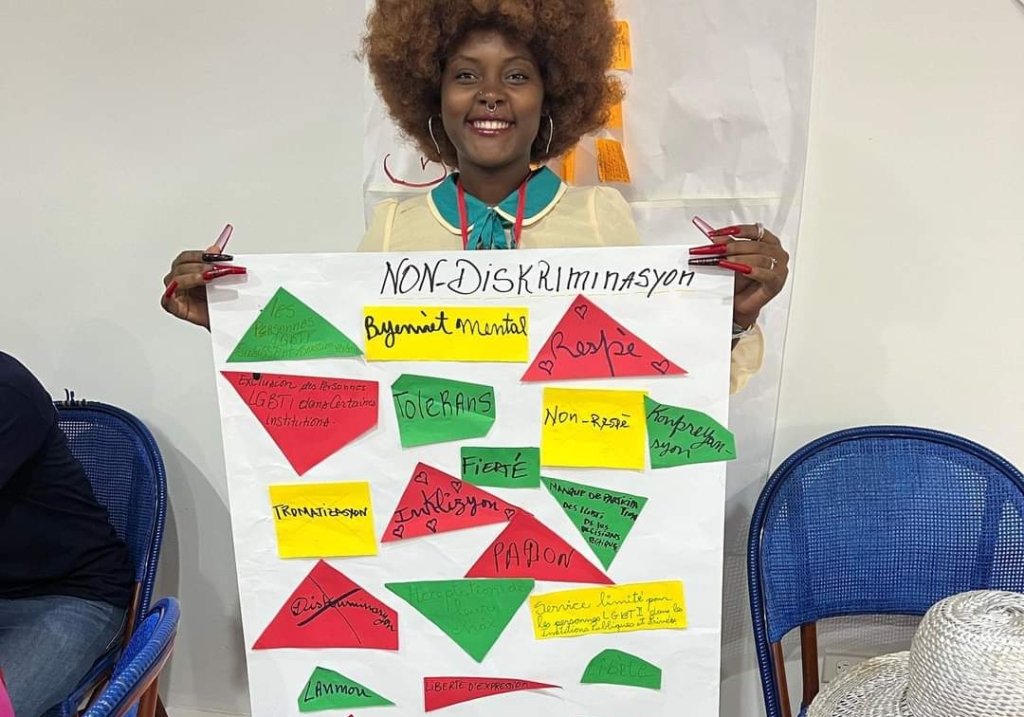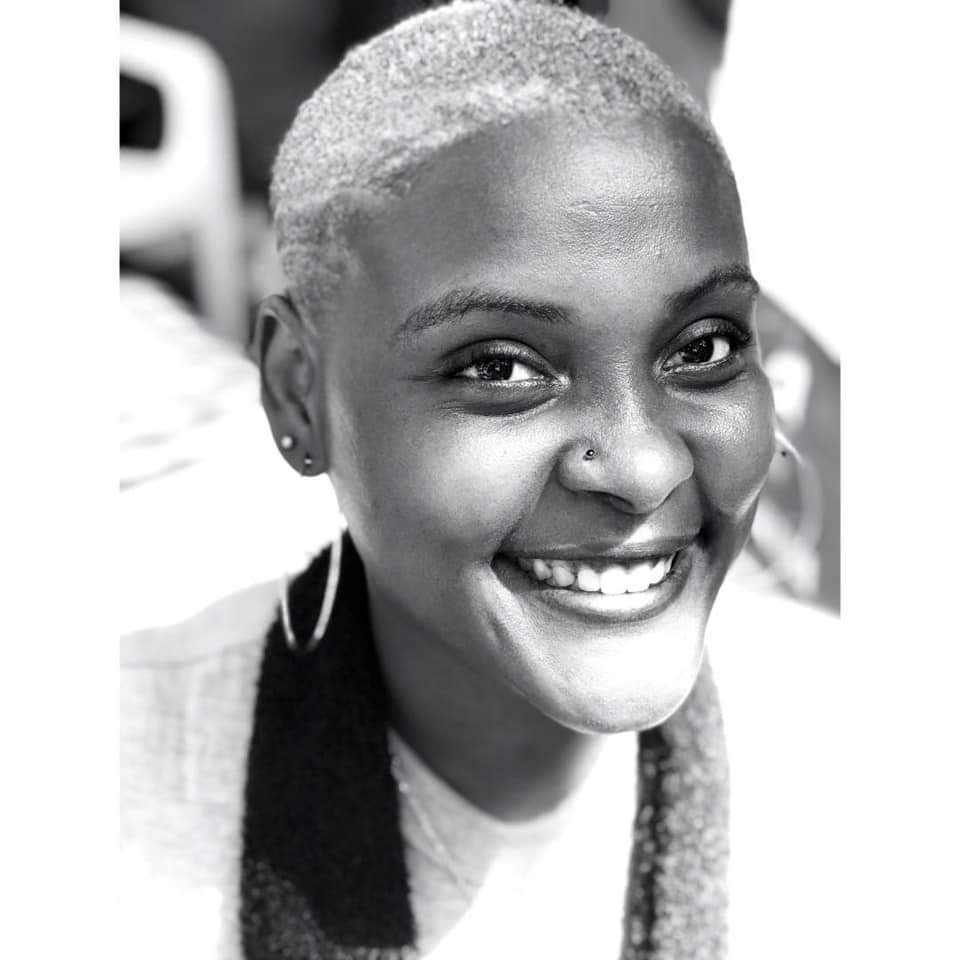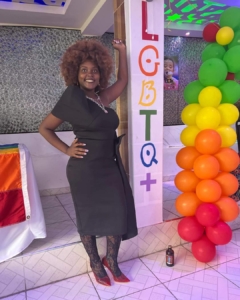Haitian LGBT movement ignores women, lesbian activist says
Moïse Manoël-Florisse, is an African-Caribbean online journalist keeping an eye…
Haitian activists keep debating the role of women in the LGBT+ rights movement.

Erasing 76 Crimes spoke with Djennifer Mercer, a grassroots lesbian activist, about the dynamics at work in the LGBT+ activist community in Haiti. Mercer illustrates the growing role of women who are on the front lines as whistleblowers, where the observe and challenge dysfunctions.
Her comments continue a discussion of the role of women in the LGBT+ rights movement in Haiti, which has been a focus of these earlier commentaries published by Erasing 76 Crimes:
- The LGBT+ movement becomes a business for pushy cisgender men — Haitian LBT activist Edmide Joseph (May 9, 2023)
- ‘Every day here, we risk our lives’ — Haitian LGBTI activist Richecarde Val (May 12, 2023)
Djennifer Mercer: I would like to give my opinion, especially regarding the lack of opportunity and voice for lesbian women as well as cisgender bisexual women or trans men.

I am an intersectional feminist and I observe that most of the projects that are deployed in Haiti in the service of the LGBT+ community are for the benefit of cisgender men or trans women — that is to say biological males — and this to the detriment of other members of the LGBT+ community who are the eternal left behind.
Women are not meant to be the last wheel in politics. There’s a real discomfort with that.
Talking only about HIV produces alienation.
As Edmide said … most of the projects for the LGBT+ community in Haiti are about HIV and target men who have sex with men, as well as trans women, generally speaking.
The vast majority of women are either ignored or neglected.
Human rights projects for cisgender bisexual and lesbian women or trans men are written off. We hear about HIV as if that’s all the struggle is for LGBT+ people in Haiti. It is alienating.
Erasing 76 Crimes: What kind of projects would you like to see, as a woman?
Djennifer Mercer: In order to be able to promote projects for women, it is first necessary at the political level to make room for women. It would not make much sense if projects for women were directed and piloted almost exclusively by males, like a new form of “mansplaining.”
Regarding the projects, it is important to understand that in a patriarchal and macho society like Haiti, women often go where they are told to go, especially when they are poor and young.
For example, many young bisexual or lesbian girls pair up with men, simply because they have no information about their own sexual orientation. And an LGBT+ movement that caters only to males is not going to change that.
There is a need for more empowerment programs for young women and girls. After that, it’s a community-based approach that needs to be defined. I don’t have a ready-made answer.
Also, in a broader and more ambitious framework, in Haiti we need to be trained on international legal instruments, so that we know which international conventions and texts the Haitian government has already signed and ratified.
We need to know which recommendations have already been addressed to Haiti during the periodic review of the Office of the United Nations High Commissioner for Human Rights, in order to be able to progress on the ground of the law, facing our government.

Erasing 76 Crimes: Recently, Haitian LBT activist Edmide Joseph wrote for 76crimes about the increasing number of organizations that are being created to serve the LGBT+ community. Does that concern you, too?
Djennifer Mercer: For a small country like ours, with more than 30 LGBT+ organizations and new associations being created every month, it leaves me deeply perplexed.
One cannot avoid reflecting on the real motivations of these new association leaders, so one wonders.
Fighting for a struggle implies a collective approach, but we are witnessing entrepreneurial ventures that do not acknowledge it in a country terribly ravaged by poverty.
I don’t see this as a community approach, and I find it terribly damaging in a country where LGBT+ people are already considerably marginalized.
The creation of associations and organizations should be regulated because it is all becoming a bit anarchic, and anyone can become an activist overnight. It should be necessary to have real training to explain to people what activism is, because otherwise activism and militancy become a business.
The trigger for me was when I attended at a “psychological first aid” training where I heard a male guilt-tripping women who had been raped at night, questioning their presence in public space at dusk.
So when I heard this community leader say that a woman’s enjoyment during a rape demonstrates that it’s not really a rape, I was flabbergasted. But at that moment, I was able to take a step back from the LGBT+ activist scene in my country.
Meanwhile, around me, I could hear all these males giggling and snickering. As a woman, I was ashamed.
But the examples are legion. I think of all this “religious gender talk” — that if you are a lesbian, it will pass in time if you pray and so on. It’s almost like conversion therapy.
The LGBT+ community in Haiti needs an emergency audit.
There are people who can spend 10-15 years in LGBT+ activism in Haiti, being in charge of organizations, without even being able to explain what bisexuality is. I think that’s a serious problem.
It’s as if instead of helping people, we are destroying them, putting them in even more distress. So for me, instead of creating new associations, people within the LGBT+ community would do better to have a healthy introspection, because quantity is far from quality.
Today, people create organizations in the hope of receiving funds from international donors and that is why a global audit of associations that claim to help the LGBT+ public is indispensable. This audit should be accompanied by profound reforms and a complete overhaul of the LGBT+ activist milieu in Haiti, otherwise we will not get out of this situation, because the worm is in the fruit.
Without change in the short term, I’m even thinking of abandoning the LGBT+ struggle and focusing solely on feminism.
Even people outside of the LGBT+ community feel embarrassed about our leadership. That’s how deep the damage is. People are not fooled.
Erasing 76 Crimes: Is this the consequence of Haitian activists having difficulty traveling to learn about leadership as it is conducted elsewhere? What is the responsibility of international donors?
Djennifer Mercer: Donors are seen at the close of projects, but on a day-to-day basis, they don’t see the activism that is happening in Haiti.
As long as they can trust an organization, they think they are doing good. They are not aware of all the day-to-day concerns that cisgender women, as well as trans men, face.
The omerta serves men and sets women back
Other people like me make the same observation as Edmide, but prefer to maintain the omerta [secrecy] so as not to attract the wrath of males.
They talk about community problems quietly in private, rather than washing their dirty laundry in public, but this is not a strategy that pays off for the females for whom nothing changes.
The omerta has always been a losing proposition for women. There is nothing to be gained from it.
I have often avoided denouncing individuals to international donors and in doing so, by withholding information, I have not allowed the emergence of solutions where external actors could have helped us.
Regarding travel abroad, it is true that for us Haitians, it is more difficult than for nationals of other countries and I have never been able to leave my country, even to go to Santo Domingo [the capital of the Dominican Republic, which shares the island of Hispaniola with Haiti]. This hurts the community a lot.
We are often asked for two or three visas if we want to reach a final destination in a country that is not far away.
However, I’m going to hit the nail on the head, because for many people, they become activists precisely to be able to leave the country and not to be able to continue to defend human rights here.
If you want to learn, there are many resources online. But for some people who have been activists for a very long time, there is no such willingness, and they rest on what they think are their achievements.
Recent commentary from Haiti on Erasing 76 Crimes:
- ‘Every day here, we risk our lives’ — Haitian LGBTI activist Richecarde Val (May 12, 2023)
- Haiti commentary: The LGBT+ movement becomes a business for pushy cisgender men (May 9, 2023)
- Haitian community is more tolerant, but homophobic violence continues (January 8, 2023)
- LGBTI performance troupe in Haiti battles homophobia (January 4, 2023)




